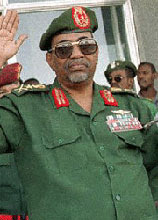I found a very interesting article on the "Daily Mirror", a Sri Lankan media outlet. The article is about the escalation in fighting between the Sri Lankan Government and the Liberation Tigers of Tamil Eelam, an insurgent group that is seeking the creation of an independent state and has employed many tactics that have been copied by other extremist organizations around the world. Anyway, there is a big debate in Sri Lanka and among the international community over whether or not a full-scale offensive by government forces to crush the rebel movement is the best option, or if a true peace agreement combined with aggressive diplomacy would be a better road to take. Well, the government and the LTTE have already made up their minds, and have engaged in fierce fighting in the north in recent weeks, along with the LTTE's continued use of bombings and ambushes. The thing is though, much of this was happening even when both sides had signed onto a peace treaty.
When I read it, I couldn't help but think of the debate here in the United States over foreign policy. How often do politicians exchange views over whether or not we should engage Iran and Syria, or demand we withdraw from Iraq even before the insurgency has been defeated. Perhaps the USA has more in common with a tiny island-nation in the Indian Ocean than we might think. The big difference though, is that Sri Lanka's leaders are debating the next step as the fighting rages in their own backyard. Imagine if our leaders were debating the war on terrorism while it was taking place on our homeland and American cities were under siege from mortar shelling, gunfire, and suicide bombers like Sri Lanka has been dealing with for decades.
In my opinion, war is sometimes necessary to succeed in making the world a safer place in the long run, although a complex war like the one in Sri Lanka might be more difficult to address. Decisions like removing Saddam Hussein and the Taliban from power and intervening in Bosnia are certainly critical to achieving peace. No matter how hot the debate gets, sitting back and allowing someone like Saddam Hussein to massacre his own people is far from achieving "peace", and withdrawing from Iraq early would be the same.
Diplomacy is the best option available if the two sides actually want peace. For example, conflicts like the one in Northern Ireland have been resolved by doing so. Israelis and Palestinians seem to want peace, and have been holding talks even as terror groups like Hamas do everything possible to sabotage them. In the end, that conflict will have to be resolved through dialogue, and I believe that both sides understand that given the horrendous suffering the 60-year conflict has caused.
At the same time, we cannot be nieve and live in a fantasy world. Proposals like the one being suggested by Pakistan's new Prime Minister to "engage" with the Taliban (yes, the same Taliban that has been gleefully massacring Pakistanis with nail bombs, assassinating the country's leaders, and setting it on a path of death and destruction) will only lead to failure.
Peace is a difficult road and there is no single solution to acheiving it.
Wow
5 years ago














